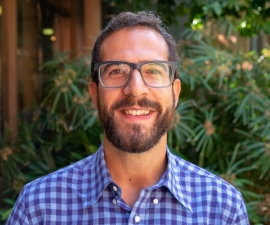

Research Bio
Diego Pirillo (Ph.D., Scuola Normale Superiore) is Professor of Italian Studies and affiliated Faculty in the History Department. His work explores how mobility, displacement, and colonialism shaped the intellectual and cultural history of early modern Italy, Europe and the Atlantic world. He has a secondary interest in modern and contemporary Italian history.
His most recent book is entitled The Atlantic Republic of Letters. Knowledge and Colonialism in the Age of Franklin (Philadelphia: University of Pennsylvania Press, 2026). Studying the transatlantic circulation of books and information in the long eighteenth-century, The Atlantic Republic of Letters examines how early American scholars envisioned and coordinated the colonial project. While arguing that the ‘taxonomic impulse’ defined the Republic of Letters during the Enlightenment, the book shows that various disciplines and intellectual practices, such as botany, lexicography, antiquarianism, and bibliography, served as the instruments of European order, facilitating the classification and subjugation of North America’s nature and peoples.
His previous book The Refugee-Diplomat: Venice, England and the Reformation (Ithaca, Cornell: University Press, 2018, was awarded the 2019 MLA Aldo and Jeanne Scaglione Prize for Italian Studies. The Refugee Diplomat offers an alternative history of early modern diplomacy, centered not on states and their official representatives but around the figure of “the refugee-diplomat” and, more specifically, Italian religious refugees who forged ties with English and northern European Protestants in the hope of inspiring an Italian Reformation.
His current book project, entitled Renaissance Refugees: Negotiating Displacement in Early Modern Italy (under contract with Cambridge University Press), is a comparative study of four displaced communities and investigates how early modern refugees coped with forced migration, negotiating with governments to prevent persecutions and expulsions.
He is also the co-editor of 4 volumes and special issues, including Braudel's La Méditerranée: Paradigms and Possibilities after 75 Years, Special issue for Republics of Letters (2025), Reframing Treaties in the Late Medieval and Early Modern West, (Oxford: Oxford University Press, 2025), "Rethinking Catholicism in Early Modern Italy: Gender, Space, Mobility"(link is external), special issue of Religions, (2023).
Prof. Pirillo has held visiting Professorships at Dartmouth College and UCLA, where he was the 2024/25 Speroni Chair in Medieval and Renaissance Studies. He has been fellow of Villa I Tatti (the Harvard University Center for Italian Renaissance Studies), and his work has been supported by the Andrew W. Mellon Foundation, the American Philosophical Society, the Hellman Foundation, the France-Berkeley Fund, the Houghton Library, the Library Company of Philadelphia, the Newberry Library, the John Carter Brown Library, the Fondazione Giorgio Cini.
Research Expertise and Interest
Renaissance Europe, early modern Europe, Atlantic History, History of Books and Reading, colonialism, history of science and technology
